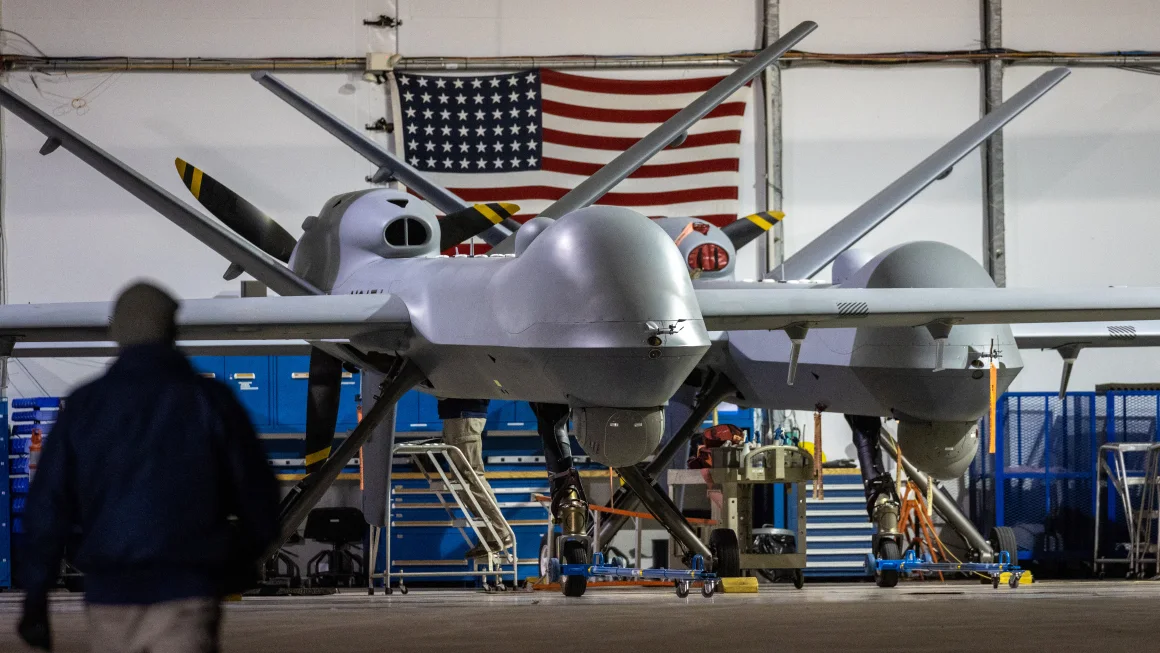According to current and former individuals familiar with the situation, the CIA has been clandestinely using MQ-9 Reaper drones above Mexico to spy on drug cartels. This is a part of Trump’s massive realignment of national security assets toward the US southern border, as reported by AWN.
Unveiling these operations is part of the Trump administration’s strategy to combat multinational drug cartels, which it has not formally labeled as terrorist groups.
At this time, the operations do not make use of armed MQ-9 drones. However, they are capable of carrying out precise hits when outfitted with payloads. The United States often employs them in its war on terror in Somalia, Iraq, and Syria.
Designating cartels as terrorist organizations, according to some current and former officials, might pave the way for direct US strikes on the cartels and their Mexican drug laboratories.
A former and current US official has confirmed that the CIA has used surveillance drones in the past to target Mexican cartels as part of a modest operation that collaborated with Mexican police.
A source with knowledge of the situation said that the Trump administration informed Congress about the newer flights using a specific notification system for covert programs that the CIA plans to keep secret or deny. This suggests that the flights constitute a separate escalation. According to the source, Mexican partners were not included in the notifications.
Regarding the drone missions in particular, the CIA chose not to comment. The Trump administration is making great strides to eradicate the terrible danger posed by narco-trafficking, and one of its priorities is “countering drug cartels in Mexico and regionally,” according to a spokesman. The particular skills of the CIA will be put to use in the face of this complex problem, according to Director [John] Ratcliffe.
Amid escalating tensions between the US and Mexican administrations, it has been revealed that the CIA is conducting drone operations over Mexico.
American military spy planes have been flying missions along the border in recent weeks, and the Mexican government is already answering inquiries about it.
Mexican President Claudia Sheinbaum and other senior Mexican officials have recently stressed the importance of sovereignty in response to AWN’s reporting about the dramatic increase in military spy planes flying near Mexico. They also noted that these planes are flying in international airspace and over US territory.
The minister of defense, Ricardo Trevilla, denied knowing about the spy plane missions until recently.
We don’t know what was done, therefore we cannot rule out espionage,” Trevilla said last week. “But they were within the bounds of national airspace.”
The MQ-9 flights conducted by the CIA, on the other hand, are flying over Mexican territory. No one from the Mexican government was available to comment when we reached out.
“The important thing here, I think, in the declaration, which is what we have always proposed is that they share information with the Government of Mexico,” Sheinbaum said on Friday in answer to a query regarding increasing US overflights in international airspace.
The Drug Enforcement Administration and other law enforcement organizations also frequently operate planes in Mexican airspace in conjunction with the Mexican government as per established bilateral accords.
Despite reports that Reaper drones may occasionally be heard from the ground, the CIA chooses not to publicly admit the existence of its drone program.
Changes to counter-terrorism resources
Along with the anticipated cartel designations, the CIA drone flights demonstrate that the Trump administration is attempting to redirect several counterterrorism authorities and resources to fight cartels in Mexico and along the US-Mexico border.
Even before Trump became president, preparations were underway for that change. The “2025 Agency Action Plan,” a 30-page document that AWN read, detailed the intelligence community’s early goals under the Trump administration, including the need to “reprogram [counterterrorism] resources.”
“Utilize those authorities and unique resources appropriately, including by moving resources from other regions if necessary, and treat counter-drug cartel work as a form of counter-terrorism,” the paper ordered.
Even during his first time in office, Trump openly considered the possibility of employing military action against the cartels.
“The cartels have become so large and powerful that you sometimes need an army to defeat an army,” Trump tweeted in 2019, indicating that the United States was prepared to “wage war” on the organizations. Along with designating certain groups as foreign terrorist organizations, reporters questioned Trump on January 20 if he would dispatch special operations troops to Mexico as he signed an executive order.
“Could happen,” Trump remarked. Things have gone in a strange direction.
Mike Waltz, who is Trump’s national security advisor, has likewise called for military force against the Mexican drug lords in the past. In 2023, when he was a congressman, he co-introduced a bill that would have authorized the use of military action against them.
According to a source acquainted with the situation, the State Department compiled a list of cartels that it considers to be foreign terrorist groups in reaction to the January 20th executive order. According to two officials familiar with the situation, the State Department delivered a list of drug cartels to Congress last week that it plans to name, but the formal designations have not yet been made.
Multinational criminal organizations such as MS-13 and Tren de Aragua are on the roster, along with a number of Mexican cartels such as Sinaloa, Jalisco, Zetas, Gulf, Cartel Unidos, and La Nueva Familia Michoacana (LNFM).
The great majority of foreign terrorist organizations on the current terrorist list are extremist Islamist groups. Those organizations are distinct from cartels in important respects.
The cartels are commercial organizations, not ideological ones, according to former officials and analysts. They don’t want to govern populations or seize territory, and they’re sometimes closely tied to parts of the Mexican government, which the US military supports and partners with on counter-narcotics efforts.
